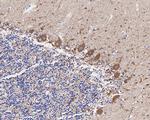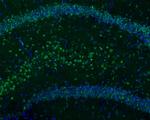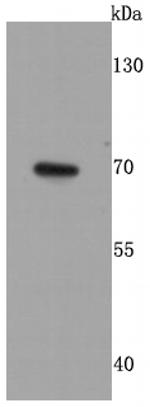Search Thermo Fisher Scientific
FIGURE: 1 / 4
GAD67 Antibody (MA5-32624) in IHC (P)




Product Details
MA5-32624
Species Reactivity
Host/Isotype
Expression System
Class
Type
Clone
Immunogen
Conjugate
Form
Concentration
Purification
Storage buffer
Contains
Storage conditions
Shipping conditions
RRID
Product Specific Information
Recombinant rabbit monoclonal antibodies are produced using in vitro expression systems. The expression systems are developed by cloning in the specific antibody DNA sequences from immunoreactive rabbits. Then, individual clones are screened to select the best candidates for production. The advantages of using recombinant rabbit monoclonal antibodies include: better specificity and sensitivity, lot-to-lot consistency, animal origin-free formulations, and broader immunoreactivity to diverse targets due to larger rabbit immune repertoire.
Target Information
GAD-65 and GAD-67 are members of the group II decarboxylase family of proteins and are responsible for catalyzing the rate limiting step in the production of GABA (gamma-aminobutyric acid) from L-glutamic acid. Although both GADs are found in the brain, GAD-65 localizes to synaptic vesicle membranes in nerve terminals, while GAD-67 is distributed throughout the cell. GAD-67 is responsible for the basal levels of GABA synthesis. In the case of a heightened demand for GABA in neurotransmission, GAD-65 will transiently activate to assist in GABA production. The loss of GAD-65 is detrimental and can impair GABA neurotransmission, however the loss of GAD-67 is lethal. Due to alternative splicing, two isoforms exist for GAD-67: the predominant GAD-67 form and the minor GAD-25 form.
For Research Use Only. Not for use in diagnostic procedures. Not for resale without express authorization.
References (0)
Bioinformatics
Protein Aliases: 67 kDa glutamic acid decarboxylase; FLJ45882; GAD 67; GAD-67; Glutamate decarboxylase 1; Glutamate decarboxylase 1 (brain); glutamate decarboxylase 1 (brain, 67kDa); glutamate decarboxylase 1 variant GAD67NT; Glutamate decarboxylase 67 kDa isoform; GLUTAMATE DECARBOXYLASE, 67 KD ISOFORM (GAD-67) (67 KD GLUTAMIC ACID DECARBOXYLASE); glutamic acid decarboxylase 1; OTTHUMP00000041055
Gene Aliases: CPSQ1; EP10; GAD; Gad-1; GAD1; GAD25; GAD44; GAD67; SCP
UniProt ID: (Human) Q99259, (Mouse) P48318, (Rat) P18088
Entrez Gene ID: (Human) 2571, (Mouse) 14415, (Rat) 24379

Performance Guarantee
If an Invitrogen™ antibody doesn't perform as described on our website or datasheet,we'll replace the product at no cost to you, or provide you with a credit for a future purchase.*
Learn more
We're here to help
Get expert recommendations for common problems or connect directly with an on staff expert for technical assistance related to applications, equipment and general product use.
Contact tech support
